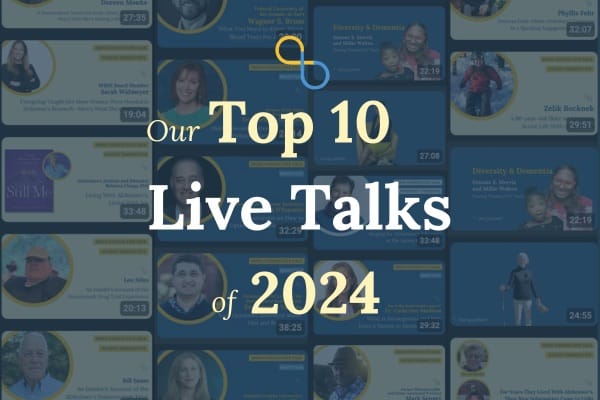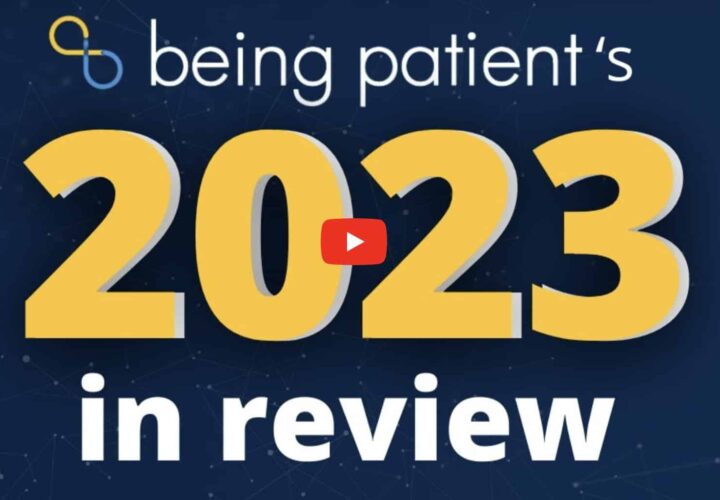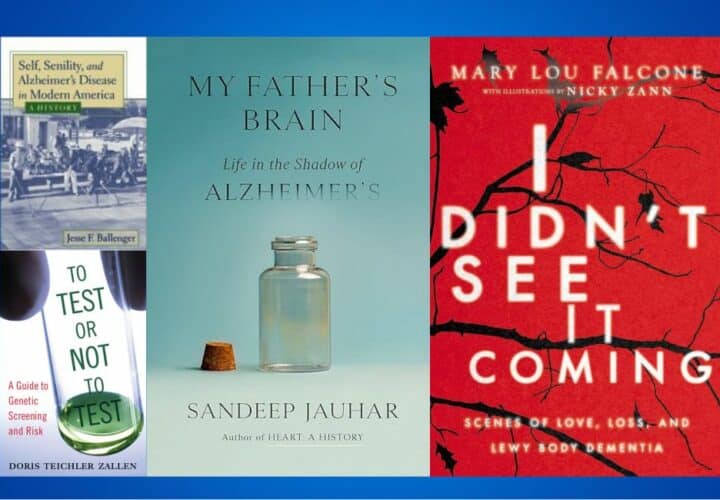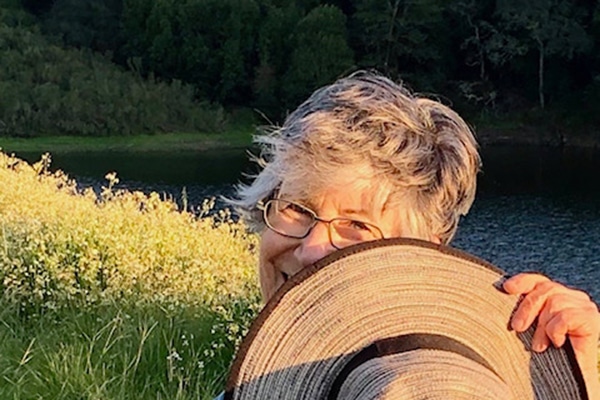2024 was a big year for our Live Talks series, covering topics from caregiving to seizures to Long COVID. Here were our top 10 most popular interviews.
This past year was a big one for Alzheimer’s, dementia, and brain health coverage at Being Patient, including insights from the voices of our Live Talk series. On Being Patient’s Facebook, we host regular live interviews with experts, advocates, and patients as a part of our mission to bring you trustworthy information that’s easy to understand. We hosted 40 different experts on our Live Talks series in 2024 — around 20 hours with leading Alzheimer’s and dementia experts and with families and people living with dementia sharing their stories. Thousands of you tuned in from all over the world on our live streams and our YouTube channel.
Among the topics that resonated most, you’ll find:
- Insights into anosognosia and its role in caregiving
- A look into the “unimaginable lands” dementia caregivers navigate
- An explanation of the connection between seizures and dementia
- Clarity from an expert on semaglutide drugs like Ozempic and the brain
- Insights into neuroplasticity and improving cognition
- Two returning guests on living well with Alzheimer’s disease
- An explanation of the latest research on Long COVID and the brain
- Invaluable dementia caregiving advice from Teepa Snow
10. When someome doesn’t realize they have dementia: An anosognosia explainer
Caregivers of loved ones with Alzheimer’s and other forms of dementia often need to navigate different realities. Anosognosia is one such reality where someone with dementia has no idea that they have a neurodegenerative disease. Dr. Catherine Madison joined Being Patient Live Talks to discuss how understanding the condition of anosognosia can help caregivers provide better care for their loved ones.
“I call [dementia] a horizontal illness because it affects the individual and everyone who’s connected with them in daily life,” Madison explained in the interview. “Being aware of this condition of anosognosia allows people and family members around the person who’s having difficulty to alter their approach.”
Navigating anosognosia is a common experience that resonated with our audience, coming in at the number 10th most popular live talk in 2024. By sharing her knowledge of the condition and providing examples from her work assisting caregivers, Madison was able to provide actionable advice for caregivers to put into practice.
Read the article here or watch the interview with Dr. Catherine Madison below.
Catherine Madison: What is Anosognosia and Why Does it Matter in Dementia Care?
9. ‘Unimaginable Lands’: Writer Dasha Kiper on the challenges of dementia caregiving
The next most popular live talk also spoke to the realities that dementia caregivers navigate, this time focusing on Dasha Kiper’s book, Travelers to Unimaginable Lands: Stories of Dementia, the Caregiver, and the Human Brain. In this Live Talk, she shared how she researched the dementia caregiver experience and the impact of caregiving on cognition.
“People who have dementia are a lot more complex and a lot more capable than people give them credit for,” Kiper explained. “The healthy brain can be as helpless, as irrational, and as volatile as the person who has the disease.”
Sharing her own experience of caregiving and running support groups, as well as interviewing caregivers for the book, she sheds light not just on the brain with dementia but also on the brain providing caregiving. Plus, she led more people in our audience to read about how the caregiving experience intersects with brain health.
Read the article here or watch the full interview with Dasha Kiper below.
Dasha Kiper: Shedding Light on the Challenges of Dementia Caregiving Through Storytelling
8. A University of Virginia endocrinologist explains ozempic’s impact on the brain
In 2024, reports on semaglutide drugs like Ozempic and Wegovy were everywhere. In addition, with the success of these drugs, researchers began looking into whether semaglutide drugs could have applications for bolstering brain health. Being Patient followed this topic closely this year, as did our audience. In light of this research and the buzz around these drugs, we invited Dr. Heather Ferris to share her insights on semaglutide drugs, their impact on the brain, and their potential for brain health research.
“In the end, you don’t care how much plaque you have in your brain, right? You care whether you can remember your grandkid’s name,” Ferris explained. “That’s where I see these drugs fitting in.”
Ultimately, drugs like Ozempic and Wegovy could be a piece of the puzzle to improving overall health to combat Alzheimer’s risk. In addition, with obesity and diabetes being risk factors for Alzheimer’s, our audience was understandably interested in the interview. By sharing her insights from research on these drugs, Ferris clarified how weight loss drugs like these work and potential brain health outcomes.
Read the article here or watch the full interview with Dr. Heather Ferris below.
Dr. Heather Ferris: This is Your Brain on Ozempic
7. What’s the link between seizures, cognitive impairment, and dementia?
Many people living with dementia can experience seizures as part of their symptoms, but seizures can also be mistaken for cognitive impairment. Because many people in our audience deal with seizures themselves or with their loved ones, we invited Dr. Ifrah Zawar to explain seizures and dementia.
“The more severe the dementia, the more likely they are to have seizures,” Zawar explained. “On the flip side, just like you said, people with seizures also, especially with uncontrolled seizures, often experience cognitive impairment and cognitive decline.”
Ultimately, with seizures and dementia, for her, it is a bi-directional “chicken or egg” relationship, which is why if you suspect you have seizures, it’s important to speak to your doctor about it. In the talk, Zawar explained how seizures work and how they may differ in presentation, especially with older patients. These insights helped audience members who watched the talk live and those who watched it on YouTube later.
Read the article here or watch the full interview with Dr. Ifrah Zawar below.
Dr. Ifrah Zawar: Seizures, Cognitive Decline, and Dementia
6. Expert Teepa Snow answers readers’ most pressing dementia caregiving questions
Whenever caregiving expert Teepa Snow joins Live Talks, she can help members of our audience with the caregiving challenges they are experiencing. These “Ask Teepa Anything” conversations are very popular, so her second Live Talk of 2024 came in at number six on our list.
In this talk, she answered questions about navigating disasters like Hurricane Helene and did a deep dive into bathing and everything to do with the bathroom. In particular, she shared strategies for making the bathroom a less scary experience and how caregivers can adjust to dementia’s reality, even though it doesn’t always feel natural.
“It’s really hard to let go of what we think would be best, to recognize what is best for that person [at] the moment is for us to let go of that piece because that’s no longer the piece that’s there for them,” Snow explained. Ultimately when we choose to continue trying to do something that is not longer working, “what we’re doing is sort of a torture,” even though we don’t mean it that way.
By providing her unique insights into bathing, navigating disasters, and engaging people with dementia, Snow was able to provide our audience with key strategies for some of their deepest questions, whether they tuned in live or watched on YouTube later.
Read the article here or watch the full interview with Teepa Snow below.
Ask Teepa Anything: Dementia Care Expert Teepa Snow Answers Your Caregiving Questions
5. A Neurologist on shares guidance for optimizing brain function
Everyone wants to improve their memory, not just people living with Alzheimer’s disease. That’s why Neurologists like Mark D’Esposito are researching the neural mechanisms behind cognition to look at how we can improve memory and recover from injury. Because our audience is so interested in how neuroplasticity could help prevent or stave off Alzheimer’s disease, we sought D’Esposito for our Brain Talks series to understand how brain function can be optimized.
As a high-profile neurologist at the University of California, Berkeley, who has been interviewed on the Huberman Lab podcast, our community was understandably interested in D’Esposito’s insights on brain health— which is why it was number five on our top live talk list.
“The real revolution over the last 20 years is that the brain has amazing plasticity, where it can change, and it could change at any age,” he explained. “We [have] much evidence that we can change the brain for the positive by an improved cognitive function through how the brain reorganizes.”
D’Esposito explained to our live and YouTube viewers how neuroplasticity works in the brain and key strategies for optimizing your cognitive function. With the context of his research, our audience was better able to understand how the brain improves memory and can heal.
Read the article here and watch the full interview below.
Dr. Mark D’Esposito: A Neurologist on How to Optimize Cognitive Function
4. A COVID expert and doctor digs into the latest research on Long COVID and the brain
Four years after the start of the COVID-19 pandemic, scientists are still investigating the impact of COVID-19 on the brain and the persistence of symptoms of people with Long COVID who have symptoms long after infection. Being Patient has reported on COVID-19 throughout 2020 and beyond. In light of the cognitive symptoms of many people with Long COVID experience, we invited Dr. William Hu to discuss what we currently know about Long COVID and any links it has to Alzheimer’s disease.
“What we’re able to see, and what others have reported, is that the virus is seen in the blood vessels in the brain,” Hu explained. “They likely enter the brain in small amounts and hide out in the brain cells or the inflammatory cells.”
With many members of our audience interested in COVID-19 and those living with Long COVID, this conversation with Hu was particularly enlightening, which is why it is our next most popular Live Talk. Hu was able to explain his research on Long COVID and the brain, provide advice on people living with the condition, and discuss what future research on COVID-19 could look like.
Read the article here or watch the full interview with Dr. William Hu below.
Dr. William T. Hu: What We Know About Long COVID and the Brain
3. A neuroscience nurse shares the story of her early-onset Alzheimer’s diagnosis
Doreen Monks was diagnosed with early-onset Alzheimer’s at the age of 63, and she returned to Live Talks this year to share her journey and her advocacy work for people like her. She returned in a panel with LuPita Gutierrez-Parker to share how she found out she was misdiagnosed since. Still, this interview early in the year resonated deeply with our audience, as it was our third most-watched Live Talk.
“I just thought I was getting dumber. I thought suddenly [I’d] lost whatever intelligence I had, or [was] losing it and couldn’t figure it out, and it was my fault, not my brain’s fault,” Monks recalled. “…I couldn’t figure out who was responsible for this.”
By sharing her diagnosis story and how she has reframed her life living with dementia, she was able to provide invaluable advice to people living with the disease and their loved ones. She was also able to highlight how even a neurology nurse could have issues seeking a diagnosis.
Read the article here or watch Doreen Monk’s full interview below.
Doreen Monks: A Neuroscience Nurse Got Early-Onset Alzheimer’s— Here’s How She’s Making a Difference
2. “How to accept your Alzheimer’s diagnosis without losing yourself”
The second most popular Live Talk of 2024 was also a returning guest to our Patient Perspective series, this time returning with a new book. Rebecca Chopp returned to discuss her latest book about her experience with Alzheimer’s, Still Me: Accepting Alzheimer’s Without Losing Yourself.
In the book, she traces her journey from being a widely published author, editor, and academic to getting diagnosed with early-stage Alzheimer’s in 2019. Chopp discusses how that discovery transitioned her into retirement and discovering her love of painting and passion for Alzheimer’s advocacy.
“I wrote the book so that people who get diagnosed will not have to spend a year flailing around and looking hither and thither for resources,” she said. “I wanted at least one place to go to get the initial ‘How to move through this diagnosis, how to live well.’”
The conversation about living well with Alzheimer’s and Chopp’s hopes for people to read the book gave our audience more insight into the patient experience. It also allowed many in our community to see how the author is doing now and get advice on memoir projects like this.
Read the interview here or watch the full interview below.
Rebecca Chopp: Living With Alzheimer’s, Living With Joy
1. Another edition of “Ask Teepa Snow Anything” on dementia caregiving
Exceeding 7 thousand streams on YouTube, the most popular Live Talk of 2024 was with caregiving expert Teepa Snow. Her Q&A interviews are always popular with our audience, and this one in early 2024 had great advice on communication, aggression in dementia, and when caregivers need to ask for help.
“One human being cannot be everything to another human being 24/7. It’s just not possible, and by setting yourself up to fail, you’ll fail,” Snow explained. “Recognizing I can’t do all this stuff, and I shouldn’t, because there’ll be nothing left of me to support this person I care about because I’m using me all up.”
Her advice for different caregiving situations and how caregivers can better ask for help gave our audience the tools to provide better care. By coming on Live Talks twice this year, Snow was able to provide twice the answers that our audience comes to again and again.
Read the article here or watch the full interview with Teepa Snow below.
Ask Teepa Snow Anything: Your Dementia Caregiving Questions Answered
Katy Koop is a writer and theater artist based in Raleigh, NC.




